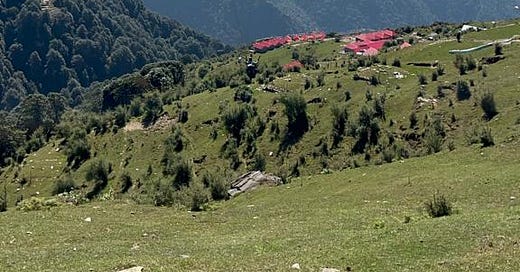Thoughts around risk
Risk as a topic is either underestimated to the extent of complete ignorance or overthought to the extent of reducing it to a simple number. Taking it simply on word value still suffices.
Recently I was a part of a discussion in one of the investment forums regarding different businesses and how risky they are. Some participants had preconceived assumptions about risk involved in certain businesses from airlines to auto to FMCG to iron and steel.
While some businesses like airlines are perceived to be riskier than others, we still see millions of people starting, operating, failing and restarting their businesses in this industry. Just like people in other industries, they are working for profits too. They’re neither doing charity nor doing a service to mankind by doing the supposed dirty work by taking more risk.
I can’t be in a better place and time to write about risk. I am sitting in Bir, the world’s second highest and second best paragliding site, a tiny town in the lap of Himalayas and have made a 4000-odd feet descent from a 30 minute paragliding flight this morning.
My experience was one with an adrenaline rush, coupled with a serene and mesmerising calmness. But that is my experience of the activity. If you ask my friend who jumped just 10 minutes before me, his experience was full of adrenaline rush, coupled with lots of shouting and begging his tandem to land him immediately. This further contributed to my understanding of the perception of risk. All else being equal (in this case the wind, weather, altitude, etc.), two people had drastically different experiences. Imagine how unique everyone’s experience who jumped today would be!
I’m now clear that the definition of ‘Risk’ is not the same for everyone.
Humans have always been busy with breaking down complex concepts into bite-sized, digestible pieces to understand and control them better. The same attempts were made to measure risk and put a number and unit of measurement for the same. They have definitely succeeded in theory however, in my opinion, it doesn’t conform to the reality that is ever changing.
Some common measurements of risk include standard deviation, Sharpe ratio, beta, value at risk (VaR), conditional value at risk (CVaR), and R-squared and if you go deeper into deriving their formulas, you’ll notice that the calculation has a lot to do with the movements in the market price. However, when you’re analysing a company with respect to its operations, management, business, market positioning, supply side advantage, forensics and so on, market price as an input has zero role to play. The only time market price will actually matter is when you want to compare it with your intrinsic value (the price at which you are ready to buy its shares) before buying.
If the equation of risk and its inputs were so damn precise, all of the human race would have just one number as their answer to risk and we all would act on basis of that number. But even when you think that the stock you own has no future and are selling your stock at 100% profit, you tend to immediately find a buyer who thinks otherwise and the parameters for you and the buyer are very different.
“Risk comes from not knowing what you're doing” – Warren Buffett
If you enter an unfamiliar room with no lights, you probably wouldn’t immediately get in because you don’t know what that room has. You might hit your little finger to furniture, or it may not have furniture at all, it may be infested or worse, haunted. However, if the lights are on, you enter confidently because you have more information about your surroundings. Similarly, if you to enter the room daily, you’d be a lot more familiar.
What we just saw is a simple example of ruling out uncertainty and being more comfortable and familiar with the room. It works in the same way in everything in life. If you’re working in a diamond business, you’ll understand other diamond businesses quickly rather than understanding oil or a pharma business because it’s your territory.
It’s safe to say that a person belonging to a certain industry understands that industry better than others. That’s where your eyes and head should be while assessing investments too. When you’re assessing a business that’s in your known territory – famously known as ‘Circle of Competence’ – you tend to understand the intricacies around it quickly and at times even better than analysts who work day and night assessing businesses.
Conclusion
Risk is just another word for uncertainty. When you are not able to control the surroundings around you, you find them risky. The most recent example of it was COVID when we were scared of the unknown and could neither control its spread, nor its effects. Similar was the case with many other diseases throughout our history.
The best way to reduce risk is to keep getting more knowledge on the subject and rule out as many variables as possible so that when the situation does not favour, you do not panic and make decisions in haste that usually do not work in your favour.



